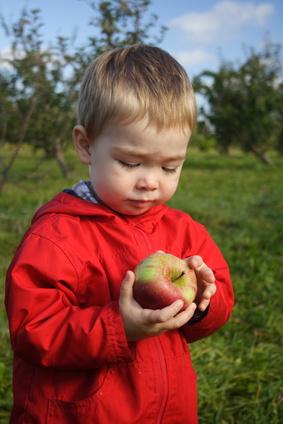A 2008 study conducted by the Harris Interactive Service Bureau on behalf of Vegetarian Times magazine reported 7.3 million adults in the United States follow a vegetarian diet. According to Elizabeth Turner, Vegetarian Times’ editor-in-chief, consumer interest in vegetarian food is increasing. It’s no surprise, then, that the growing number of adults choosing a vegetarian diet are wondering whether it is a healthy choice for their children.
Significance
Most children start life as vegetarians. Whether they breastfeed or receive milk- or soy-based formula, animal protein is generally not introduced into an infant’s diet until after the first six months of life. After the first year, your child’s dietary needs begin to change drastically. Although nutritionists view vegetarian diets as healthy, understanding and meeting your child’s nutritional requirements as he grows is especially important.
Types
“Vegetarian” is an umbrella term that covers smaller, more food-specific groups. For example, an ovo-vegetarian is a person who eats eggs but no meat. A lacto-vegetarian is a person who eats dairy products but no meat. A person who consumes both dairy and eggs is a lacto-ovo vegetarian, and a semi-vegetarian might eat chicken and poultry but no red meat. A vegan diet is the strictest of all the vegetarian diets and excludes all meat, dairy and eggs.
Becoming a Vegetarian
Some children are born into a vegetarian household because it’s what either their parents or culture practice. In that respect, it’s only natural they also adopt the same diet as mom and dad. However, some parents have to modify their child’s diet when allergies to egg- or dairy-based products arise. In other instances, it’s the child who initiates interest in becoming a vegetarian. Older children who are aware of the moral and environmental consequences of eating meat might opt to eliminate it completely.
Benefits
Children who eat a vegetarian diet experience many health-related benefits that last into adulthood. Plant-based diets are naturally high in fiber and low in fat. According to the Kids Health website, vegetarian diets promote healthy weight management and improve overall cardiovascular health. A vegetarian diet also reduces diseases such as hypertension and diabetes.
Considerations
According to Shannon Martinez-Pedersen and Carol M. Meerschaert of Vegetarian Nutrition, it’s important to consider your child’s nutritional needs when planning a vegetarian diet. Toddlers are a picky lot by nature, so it’s up to you to make sure that your child consumes enough calories to meet the energy needs of his growing body. Adolescents and teens are also tricky because they don’t always make wise food choices for themselves. Especially important are vitamins B12 and D, calcium, protein, iron and zinc. Thankfully, many foods your child already likes are suitable for a vegetarian diet. Add to your shopping list milk and other dairy products, fortified cereal and orange juice, leafy green vegetables, nuts, beans and dried fruit. When first starting out with a vegetarian diet, feed your child food he likes. Fruit smoothies or peanut butter on crackers or apple slices are two kid-friendly snacks. Instead of taking meat and dairy off the menu completely, substitute soy meat and vegan cheese in his favorite dishes.





